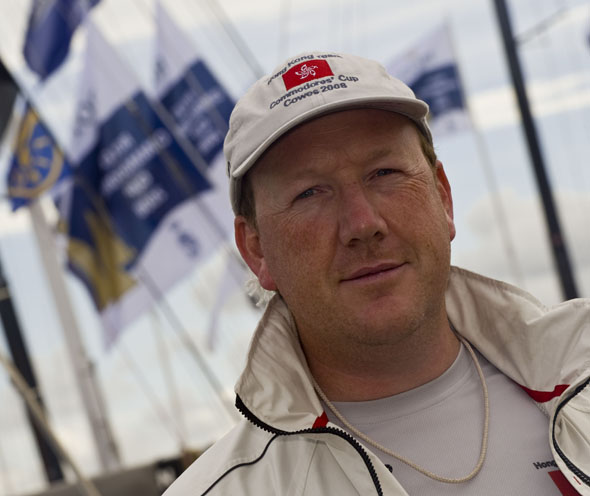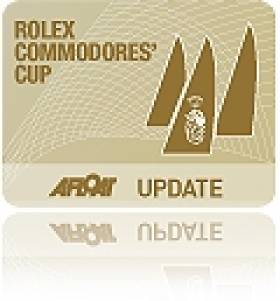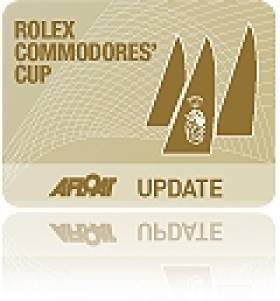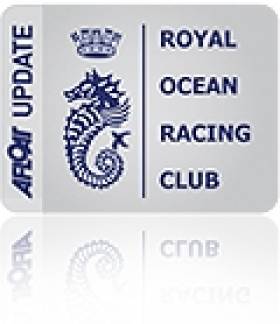Displaying items by tag: Commodores' Cup
Commodores' Cup 2010 Timetable Here!
Saturday, 14 August
Registration/Skippers' briefing/Opening Reception
Sunday, 15 August
2 x Solent inshore races (1.0 each)
Monday, 16 August
2 x Solent inshore races (1.0 each)
Tuesday, 17 August
Offshore race (2.5)
Wednesday, 18 August
Offshore race continues
Thursday, 19 August
Rolex Trophy Day 1 x Solent inshore race (1.0)
Friday, 20 August
Round the Island race (1.5)
Saturday, 21 August
1 x Solent inshore race (AM) (2.0)
Prize Giving (Royal Yacht Squadron) 1700
Mark Mills is Designer of Choice for 2010 Commodores' Cup
The ten challenges lodged for the 2010 is the smallest Commodores' Cup fleet size since 2000 when seven teams contested the trophy but in the battle of the designers it's Afloat's sailor of the year Mark Mills from Wicklow who comes out on top with six of his designs participating this weekend.
The USA has won the event twice (1992 & 94), GBR twice (2004 & 2008), France twice (2002 & 2006), Germany once (1998), the Channel Islands once (2000) and England once (1998).
Hong Kong has competed twice before in 1992 and 2008. South Africa is competing for the first time. France has competed in every event since 2000.
Racing commences on Sunday, 15 August, with the first race scheduled for 10.30AM and, as one would expect, there has been no shortage of activity since close of challenges for the 10th biennial Rolex Commodores' Cup.
Whilst the single team nations, Ireland, South Africa and Hong Kong, set out their stall early, identifying boats and team members, the multi-team nations, United Kingdom and France have faced more complex decision-making in defining the composition of their various line-ups.
Ten teams, comprising a total of thirty yachts spread over five nations, will be on the start line all fired up in anticipation of a highly competitive event. Teams are made up of three boats, one in each of three precise rating bands. The full National team listings are available HERE and Ireland's crew list HERE. Below are some more highlights:
Class 1
Highest Rating: GBR2045R Alice II Simon Henning (GBR White) Farr 45 - Rating: 1.226
Lowest Ratings: GBR851R Cracklin' Rosie Brian Wilkinson (GBR Black) Corby 40 - Rating: 1.110
FRA36777 Codiam N. Loday & C. Nicoleau (FRA Blue) Grand Soleil 43 – Rating: 1.110
Largest Yacht: GBR2045R Alice II Simon Henning (GBR White) Farr 45 – 13.8m
Smallest Yachts: FRA35439 Inis Mor Laurent Gouy (FRA Yellow) Ker 39 – 11.8m
IRL3939 Antix Anthony O'Leary (IRL) Ker 39 – 11.8m
Class 2
Highest Rating: HKG2097 Blondie IV Anthony Day (HKG) King 40 – Rating: 1.119
Lowest Rating: GBR42N La Reponse A McIrvine & P Morton (GBR White) First 40 – Rating: 1.085
Largest Yachts: GBR2215L Quokka 8 Peter Rutter (GBR Red) Grand Soleil 43 – 13.25m
GBR2643R Artemis Paul Turner (GBR Black) Grand Soleil 43 – 13.25m
Smallest Yacht: IRL39000 Marinerscove.ie David Dwyer (IRL) Mills 39 – 11.88m
Class 3
Highest Rating: GBR8410R Premier Flair Jim MacGregor (GBR Red) Elan 410 – Rating 1.074
Lowest Ratings: FRA21706 RealAx François Blossier (FRA Red) A35 – Rating: 1.030
GBR8809R Inspara David Hudson (RSA) J-109 – Rating: 1.030
Largest Yacht: GBR8410R Premier Flair Jim MacGregor (GBR Red) Elan 410 – 12.27m
Smallest Yachts: FRA34634 Prime Time M Alperovitch/J Huillard (FRA Yellow) A 35 – 10.59m
FRA21706 RealAx François Blossier (FRA Red) A35 – 10.59m
FRA37311 Gaia Bernard Moureau (FRA White) JND35 – 10.59m
The Rating Bands:
Class 1 1.110 – 1.230 DLR not exceeding 200
Class 2 1.075 – 1.119 DLR not exceeding 200
Class 3 1.025 – 1.074 DLR not exceeding 215
DLR = Displacement Length Ratio
The Rolex Commodores' Cup will be held off Cowes, Isle of Wight, from 14 August to 21 August 2010.
Ten Commodore's Cup Teams Announced
The Royal Ocean Racing Club has released the final entry list for next week's Commodore's Cup on the Solent.
Rolex Commodores' Cup TeamsTeam: France Yellow
1 FRA35439 Inis Mor Ker 39Laurent Gouy
2 FRA122Pen Azen J 122 Philippe Delaporte
3 FRA34634 Prime Time A 35M Alperovitch & J Huillard
Team: France Blue
1 FRA36777 Codiam Grand Soleil 43N Loday & J C Nicoleau
2 FRA36689 Coup de Couer First 40M de Saint Denis & G Trentesaux
3 FRA27700 Goa X40 Samuel Prietz
Team: France White
1 FRA27967 Jivaro J 133 Yves Grosjean
2 FRA35950 Nutmeg J 122 François Lognone
3 FRA37311 Gaia JND 35 Bernard Moureau
Team: France Red
1 FRA34649 Finisterre Capital X 41 Patrick Baune
2 FRA36743 Jean Charl' A40 RC Jean-Marie Lessard
3 FRA21706 RealAx A 35 François Blossier
Team: GBR Red
1 USA52915 White Heat Summit 40 Michael Williamson
2 GBR2215L Quokka 8 Grand Soleil 43 Peter Rutter
3 GBR8410R Premier Flair Elan 410 Jim Macgregor
Team: GBR White
1 GBR2045R Alice II Farr 45 Simon Henning
2GBR42N La Réponse First 40 Andrew McIrvine & Peter Morton
3GBR1352R No Chance First 35 Chris and Hannah Neve
Team: GBR Black
1 GBR851R Cracklin Rosie Corby 40 Brian Wilkinson
2 GBR2643R Artemis Grand Soleil 43Paul Turner
3GBR8407R Encore First 40.7 Steven Anderson
Team: Hong Kong
1 HKG2282EFG Bank Mandrake Mills 40 N Burns & F Kinmonth
2 HKG2097 Blondie IV King 40 Anthony Day
3 GER6333 Rockall III Corby 36 Christopher Opielok
Team: Ireland
1 IRL3939 Antix Anthony O'Leary Ker 39
2 IRL39000 Marinerscove.ie David Dwyer Mills 39
3 IRL36000 Roxy 6 Robert Davies Corby 36
Team: South Africa
1 SA3737Windpower Phil Gutsche Landmark 43
2GBR5940R Tokoloshe Mike Bartholomew King 40
3GBR8809R Inspara Rick Garratt & Dave Hudson J 109
Royal Cork's Jamie McWilliam Heads up Team Hong Kong
Having finished fifth overall in 2008, surprising many of the more seasoned campaigners in the process, McWilliam and his teammates were resolute in their determination to return.
With three months to go to the 10th edition of the biennial Rolex Commodores' Cup, the international fleet has every prospect of being one of the more exotic in recent events. A noteworthy success in these straightened times.
The Hong Kong team is made up of Rockall III, a Corby 36 owned by Chris Opielok, in the small boat slot. 'Opie', as he is known, is a Hong Kong sailing legend, having won two Admiral's Cups for his native Germany. Rockall III is the former Rosie, which has a dominant history in UK & Irish IRC racing. The middle boat is Blondie IV, a Mills (King) 40 chartered by Anthony Day from Helmuth Hennig, both very well known Hong Kong racers. Blondie was 2nd in class in Rolex Commodores' Cup 2008 and has an exceptional track record under her former owner. The big boat is Mandrake, Nick Burns' Mills 40.5, formerly Ngoni and Tiamat. AsTiamat, she had an outstanding Rolex Commodores' Cup in 2006.
The headline foreign contingent is perhaps South Africa, participating at the regatta for the first time. Hong Kong has confirmed it will be back following its happy venture in 2008. Thereafter, the northern European teams – Ireland, France and the United Kingdom - that are the traditional backbone of the event - will be present in numbers. Organisers, the Royal Ocean Racing Club, anticipate a total of 12 teams. Racing is from 15 to 21 August, with close of entry on 12 July.

McWilliam (pictured above) is not just to participate, mind you, but to have a crack at winning. "In 2008 we arrived with a crew that had trained hard but which had never seen the boats before the regatta, as they were either charters or brand new. This meant that we spent quite a bit of important time just before the event working on the boats instead of working on our speed, and as a result we were still learning about the boats during the series. Our team this time was determined to avoid that mistake," comments McWilliam, explaining that this time, "all the boats are owned by Hong Kong owners and we therefore have much more time [to prepare]. Our full team will be at the UK IRC Nationals in late June and we are scheduling other weekends over the summer for the boats to have new sail trials."
It is a tall order to travel almost halfway around the world to participate in a three-boat team event. The three yachts needed to compete range in size, roughly, between 35 and 45 feet. There are crews to be identified, accommodation and travel to be arranged. McWilliam is clear that it is worth the effort, "it's always exciting going to an event where you think you have a chance to win but where you know you're going to have to really perform to achieve that. It provides a great combination of expectation, anticipation, and nerves. Combined with the knowledge that we are representing the small sailing community in Hong Kong, it's a really exciting deal."
McWilliam acknowledges the difficulties involved for foreign teams, particularly getting the right boats in the right condition to the venue when they are located more than a delivery trip away. He clearly believes more countries should look more seriously at the possibilities, "I would definitely encourage other teams to participate. The Solent puts unique and intense pressure on crews and seemingly trivial moments turn out to be really critical, like a down tide bottom mark rounding where you've got to be perfect in order to hold your lane to get out of the current. I also believe that the best team here has always won the event, and that's the best recommendation I know for a regatta."
The Hong Kong team is looking forward to renewing rivalries with some of the teams it competed against in 2008. They are not here to make up the numbers, "we really enjoyed the event in 2008 and feel that the event is a good match for the type of sailing we do in Hong Kong, and therefore represents a great opportunity for Hong Kong to compete against peers and find out where we rank. We were happy with our 5th position in 2008 but saw it very much as an initial effort and unfinished business."
The Rolex Commodores' Cup is a weeklong series mixing inshore racing on the waters in and around The Solent, the body of water separating the Isle of Wight from the mainland United Kingdom, with an offshore course that takes the fleet out into The English Channel and a course round the Isle of Wight. All of the racing is typified by one thing. Comprehensive knowledge of the tides and currents affecting these areas is essential. Furthermore, it has been proved time and again that is not just the team with the best boats or the best sailors that wins. It the team that is the best prepared in all aspects.
The Rolex Commodores' Cup will be held off Cowes, Isle of Wight, from 15 to 21 August. Entries, which must be made by Member National Authorities, close on Monday 12 July.



























































